What’s going on at the Ontario Lottery and Gaming Corporation?
Sep 1st, 2009 | By Randall White | Category: Canadian Provinces[UPDATED SEPTEMBER 4.] Yesterday Ontario finance minister Dwight Duncan announced at a press conference that he had accepted the resignations of the entire board of directors of the Ontario Lottery and Gaming Corporation.
A new interim board of senior public servants has been appointed. And it has dismissed the OLG chief executive officer Kelly McDougald “with cause.” (I.e., unlike her predecessor, Duncan Brown, she will not be receiving any lavish termination settlement.)
Those who remember that Ms. McDougald only started her OLG career just under two years ago, in the wake of an earlier lottery scandal mobilized by a March 2007 report from Ontario ombudsman Andre Marin, might wonder what is going on. Just about a month ago, e.g., Mr. Marin “said he thought the OLG is now on the right track, crediting it with accepting and implementing recommendations made in 2007.”
Finance minister Duncan, on the other hand, was “given the OLG file two months ago by Premier Dalton McGuinty.” And he was “asked to take a closer look at how the corporation operates and report back on any necessary changes.” He tells us that, as a result of fresh intelligence from provincial officials, he is not at all happy with the progress on OLG reform.
He has concluded that the dubious expense accounts of some OLG employees – which “were about to be exposed by the [opposition] Progressive Conservatives,” it is said – are only a symptom of lingering deeper problems in the organizational culture. It is time for a more vigorous house cleaning than the one begun by the hiring of Kelly McDougald two years ago.
The McGuinty Liberal government, Mr. Duncan says, has also become concerned about potential accountability issues at all quasi-independent agencies, boards, and commissions under its ostensible supervision. The premier will have more to say about this over the next several days.
1. Other cynical subtexts and background noises, etc, etc …
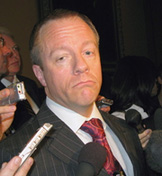
Former Ontario cabinet minister Michael Bryant, whose resignation prompted the September 17 by-election in St. Paul's (and who, quite incidentally, has just now been charged with criminal negligence in a tragic Toronto traffic accident).
For good and bad reasons, the Ontario government and politics heartland at Queen’s Park in Toronto (a name itself redolent of much that makes the public life of Canada’s most populous province so vaguely dull in the early 21st century?)Â is an often cynical place. Hardly anyone – custodial staff, journalists, members of the legislative assembly, public servants, secretaries, visiting schoolchildren, etc, etc – takes what political leaders of all parties say at face value.
There is, e.g., a provincial by-election just over two weeks away (on September 17), in the downtown Toronto riding of St. Paul’s. It’s not unusual or remotely alarming for governing parties to lose by-elections. And the Ontario Liberals will still have a solid majority in the Legislative Assembly, with or without St. Paul’s.
But St. Paul’s became vacant when one of Premier McGuinty’s rivals inside his own party (Michael Bryant) left Ontario politics for a job with the City of Toronto. The Conservatives have an apparently attractive candidate this time, in Sue-Ann Levy of the Toronto Sun. St. Paul’s is probably not “a national battlefront,” as the Toronto Star proposed a few weeks ago. But, as the Star did correctly note: “If the Progressive Conservatives … wrest the seat from the Liberals, it would be the first Tory win in Toronto – provincially or federally – in a decade.”

Liberal Eric Hoskins, left, and Tory Sue-Ann Levy, the main contestants in the St. Paul's by-election.
So, the story goes, there were concerns that the Ontario Tories, under their new leader Tim Hudak, were going to release the recently unearthed dubious expense accounts of some OLG employees, as a scandal-mongering tactic in the battle of the St. Paul’s by-election. The previous OLG scandal history shows that this issue has attractions for a regional public that buys a lot of lottery tickets from OLG. In the past there have been concerns that OLG “insiders” have somehow wound up with surprising numbers of winning lottery tickets. (And as recently as early August 2009, ombudsman Andre Marin still had lingering doubts about “insider wins” at OLG.)
It’s not easy to get the people of Ontario interested in Ontario politics. But scandal at the provincial lottery corporation just might do the trick, even among the urbane sophisticates of St. Paul’s in downtown Toronto. Moreover, as the Globe and Mail has just reported: “Mr. McGuinty has been under siege from the opposition in the past few months over lucrative contracts that another government entity, eHealth Ontario, awarded without competitive tenders and nickel-and-dime expense claims by consultants. That led to the departures of eHealth CEO Sarah Kramer and chairman Alan Hudson. But the problems at the lottery corporation eclipse those at eHealth because they involve one of the province’s biggest, most high-profile agencies.”
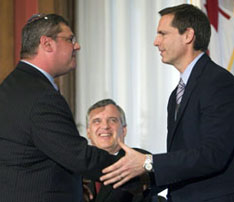
In this June 2008 photo Ontario Premier Dalton McGuinty shakes hands with David Caplan after he was sworn in as health minister. Lieutenant Governor David Onley looks on. (Adrian Wyld/Canadian Press).
Similarly, according to the new provincial Conservative leader Tim Hudak: “What we need to see, in fact, is a minister’s head on the chopping block” … You can play musical CEOs all you want. You can replace one group of hand-picked Liberals to run OLGC with another group of hand-picked Liberals to run the show. That’s not going to bring an end to this mess.”
As it happens, the minister whose head the Tories have been (unsuccessfully) demanding in the ehealth Ontario scandal is the current minister of health David Caplan – who is following in the footsteps of his mother, Elinor Caplan, who “served as a cabinet minister in the [Liberal] provincial government of David Peterson and the [Liberal] federal government of Jean Chrétien.”
And who knows? Even in the riding of St. Paul’s there may be some voters who still remember that in 2007, when the Ontario Lottery and Gaming Corporation scandal first broke, the minister formally responsible for the OLG was the then minister of public infrastructure renewal, David Caplan. At that time it was (then) NDP leader Howard Hampton who proclaimed: “You cannot have people buying lottery tickets being ripped off . . .while the minister says ‘I didn’t know anything, I didn’t hear anything’ … Mr. Caplan has to go. He has no credibility.”
2. Former board of directors chair Michael Gough …
Back in the world of late summer 2009 official prose, Michael Gough, the former chair of the OLG board of directors, has “said in a statement that neither he nor other board members billed any of the [dubious] expenses [that the Conservatives were about to expose, before the McGuinty Liberal government did it themselves]. But he said he offered to resign because he is ultimately responsible for the corporation’s actions. While board members worked tirelessly to bring about cultural change within OLG, he said, the expenses billed by employees indicate that the transformation is not complete.”
Mr. Gough seems an interesting character here. He has been involved in various aspects of the government of Ontario – as both a public servant and a private sector lawyer – since the last long-lived Tory dynasty of the immortal Bland Bill Davis from Brampton in the 1970s. And Michael Gough’s role in the OLG story underlines the sheer (and largely inaccurate, if still professionally excusable?) hyperbole in Conservative leader Tim Hudak’s urging that: “You can replace one group of hand-picked Liberals to run OLGC with another group of hand-picked Liberals to run the show. That’s not going to bring an end to this mess.”

Ron and Rhonda Campbell of Tottenham, Ontario at the OLG offices in Toronto to claim the $16 million they won in the Dec. 29, 2007 Lotto Super 7 draw.
According to the old official biography that has now been removed from the OLG website: “Michael Gough (Chair) was a partner for over twenty years in the law firm of Osler, Hoskin & Harcourt LLP where he specialized in public law and regulatory affairs. He has an extensive background in government relations, regulatory and legislative matters, and public/private partnerships in Canada and abroad. He has worked for several provincial ministries including the Ministry of Consumer and Commercial Relations, Ministry of Treasury, Economics and Intergovernmental Affairs, and Management Board of Cabinet. Until recently, Mr. Gough served as Director, Corporate Secretary, and Member of the Executive Committee of the Energy Council of Canada, as well as Director, and past Chair of the Nominating and Governance Committee of Trent University. Mr. Gough’s community involvement includes the Canadian Opera Company and the Aldeburgh Concert Society. Mr. Gough received his BA from St. Patrick’s College, his LL.B. from the University of Toronto, and an LL.M. from the London School of Economics. He was called to the Ontario Bar in 1970.”
If you happen to have an ancient collection of Ontario Government telephone directories at your disposal, you can also verify that “M.J. Gough” was indeed a legal officer in the Companies Division of the Ontario Ministry of Consumer and Commercial Relations as long ago as 1972. Then he was a solicitor in the Office of Legal Services at the Ministry of Treasury, Economics and Intergovernmental Affairs in 1975. By 1980 he had become the director of the Office of Legal Services at the Ministry of Treasury and Economics.
It was during the 1980s and 1990s that Mr. Gough settled in to his private sector career with Osler, Hoskin & Harcourt LLP, “where he specialized in public law and regulatory affairs” (building on his time in the Ontario public service). From here you can glean a few hasty details on his subsequent professional life in the early 21st century from the Internet.

Barry Shell of Brampton, Ontario picks up his winning cheque at the Ontario Lottery and Gaming headquarters in Toronto, Monday, July 20, 2009. OLG authorities had already discovered he was wanted by police for theft. He was arrested immediately after posing with his $4,377,298 cheque.
In June 2003, e.g., Michael J. Gough published a note entitled “Rules on Contracting with Government Change in Ontario” on the Osler website. A very short while later we hear that “Chair Reid Morden welcomed Doug Brown and Michael Gough to the Board” of Governors at Trent University in Peterborough, Ontario. (At this point, it is probably worth remembering, Premier Ernie Eves was still carrying on with the remnants of Mike Harris’s Conservative “common sense revolution” government of Ontario. Dalton McGuinty did not become premier until after the provincial election of October 2, 2003.)
In 2004 Michael Gough published an article entitled “The Role of Non-Share Capital Corporations in Providing Essential Public Services in Canada” in a journal called The Philanthropist. The concluding paragraph summarized his argument: “The use of community-based NSCCs represents an attractive alternative to privatization. The track record for NSCCs in virtually all contexts examined has been remarkably good. Many of the advantages found by Ontario’s Committee on Government Productivity for the growth of Crown corporations hold true for community-based NSCCs. They have fewer regulatory rigidities; there is greater freedom in personnel and financial administration; they are independent from partisan politics if properly structured; there is greater flexibility in responding to public needs; and there is much greater flexibility in raising revenues through premiums, fees, and charges … Herschel Hardin may well have been thinking of community-based NSCCs when he observed that Canadians have a genius for public enterprise.”
I am aware of no publicly available information which suggests that this article by Mr. Gough had anything to do with his subsequent career at OLG. But it may not have hurt. In any case, on June 29, 2006 it was announced that: “The McGuinty government continues its commitment to a sustainable and responsible provincial gaming industry by appointing Mr. Michael Gough B.A., LL.B, LL.M. as Chair of the Ontario Lottery and Gaming Corporation.” (A few days later it was announced as well that “Mr. Gough has been reappointed to the Board of Governors [at Trent University] for the term July 1, 2006 until June 30, 2009.”)
3. Inevitable problems of public gambling operations?
Michael Gough had been chair of the board of directors at OLG for less than a year when ombudsman Andre Marin released his very critical report on the organization, in March 2007. As already noted, the quite serious complaint at this juncture was that OLG “insiders” had somehow wound up with surprising numbers of winning lottery tickets.
As the ombudsman’s report explained: “On Oct. 25, 2006, the CBC broke the shameful story of the Corporation’s ‘insider win’ problem on its television documentary program, the fifth estate. The program, Luck of the Draw, told the story of Bob Edmonds, a senior who was cheated of his winnings by a lottery ticket retailer, only to have to fight a three-year battle with the Corporation after he revealed this wrong.” From here the March 2007 Ontario document “stopped short of recommending the province ban retailers from buying lottery tickets, but said the government-owned corporation has too cozy a relationship with the thousands of people who sell its products – and who happen to be among its best customers.”
Even before the March 2007 ombudsman’s report was publicly released, “OLG’s chief executive, Duncan Brown, abruptly resigned his post in what was widely seen as the government’s pre-emptive response to the report. But opposition parties accused [the then responsible minister David] Caplan of making Brown his scapegoat and called instead for the minister’s resignation.” (And presumably the Duncan Brown here was no relation to the Doug Brown who had joined Michael Gough on the Trent University Board of Governors in June 2003.)
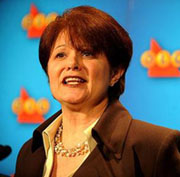
Kelly McDougald, February 4, 2009: speaking to the media about new measures limiting potential fraudulent activities and protecting the integrity of OLG (COLIN MCCONNELL STAR).
The minister`s resignation was not forthcoming in the spring of 2007. But in September it was reported that: “The embattled Ontario Lottery and Gaming Commission’s hassles with overly fortunate ticket retailers will soon become the responsibility of a new CEO following the appointment this week of former Bell Canada executive Kelly McDougald” (at a salary of some $400,000 a year – about twice as much as the premier of Ontario gets paid).
As also already noted, it would seem that Ms. McDougald’s new regime had some success in dealing with “the Corporation’s ‘insider win’ problem.” Early in August 2009 ombudsman Andre Marin gave “the Ontario Lottery and Gaming Corp. another 30 days to report back to him on its efforts to control so-called insider lottery wins.” But “Marin also said he thought the OLG is now on the right track, crediting it with accepting and implementing recommendations made in 2007.”
Again, the further complaints about OLG that at least precipitated the August 31 resignation of Michael Gough and his colleagues on the board of directors – and then the new board’s dismissal “with cause” of Kelly McDougald – involve the dubious expense accounts of some OLG employees, which were apparently “about to be exposed by the Progressive Conservatives” when the Ontario legislature returns from its summer recess on September 14, 2009.

Bob Edmonds, who fought OLG and appeared on the CBC program Luck of the Draw, died of cancer at 83 – only three days after getting a letter of apology from the corporation. (CBC).
Not everyone will find the specifics of these accounts utterly outrageous: “Some of the flagged expenses show OLG members dinged taxpayers for such items as a $7.70 pen refill, the $1,000 cancellation of a deposit on a Florida condo due to work requirements, a $1.12 cloth grocery bag and a $30 car wash claim submitted without a receipt. Also expensed was $487.50 for a nanny to be paid so a worker could attend meetings from September 2006 to December 2006.”
At the same time, it is no doubt reasonable enough to wonder about just what finance minister Dwight Duncan meant yesterday, when he said that the dubious expense accounts of some OLG employees are only a symptom of lingering deeper problems in the organizational culture. And in this context it is probably reasonable enough to wonder as well just what the taxpaying people of Ontario might reasonably expect from a public corporation, organized at arm’s length from the elected government at Queen’s Park, and dedicated to the fine art of gambling?
Similarly, as far as the organizational culture goes, it is not as if the McGuinty government has not tried to shore up its “commitment to a sustainable and responsible provincial gaming industry” in its OLG appointments. The former chair of the board of directors, Michael Gough, had a graduate education and a long and diverse experience in Ontario public life. The former CEO of OLG, Kelly McDougald, had been an executive at Bell Canada, one of the most respected private corporations in the country.

Beverly Topping and friends open the Toronto Stock Exchange, November 6, 2008. She is the lady in the grey suit, in the centre.
It is also intriguing that another member of the board of directors was Beverly Topping. According to her old official biography that has now been removed from the OLG website: “Beverly Topping is President and Chief Executive Officer of the Institute of Corporate Directors. She created, built and sold Today’s Parent Group, a publishing and consumer information company of 15 magazines, two television series and the largest family data base in Canada. She has provided nine years of service as Director of Canada Trust and CT Financial, and eight years as a Director of Cara Operations. She is recipient of the McGill University Management Achievement Award (1995) and Psychology Foundation of Canada Award for Communication and Education (1995). She is a graduate of the Institute of Corporate Directors’ Corporate Governance College, in partnership with the Rotman School.”
Moreover, what has impressed Ms. Topping’s many admirers about her career is not just that the Today’s Parent Group she created in an earlier incarnation was “a publishing and consumer information company of 15 magazines, two television series and the largest family data base in Canada.” Under her guidance it had a sparkling organizational culture and high and dynamic staff morale. It was a place where talented people enjoyed and were very good at their daily work. If you were concerned to strengthen and tighten the working culture of some other organization, you couldn’t do better than appoint Beverly Topping to its board of directors.
A final preliminary stab in this same broad direction involves comparisons between the Ontario Lottery and Gaming Corporation and similar organizations in other parts of Canada, and the neighbouring United States. Ontario is not the only place that has tried to turn its peoples’ addictions to gambling to the advantage of the public purse.
(In Ontario’s particular case: “The Ontario Lottery and Gaming Corporation Act, 1999 requires that net Provincial revenue generated from lotteries, charity casinos and racetrack slot machines support services such as the operation of hospitals, problem gambling and related programs, amateur sports, and funding for charitable and not-for-profit organizations through the Ontario Trillium Foundation.”)

Lydia Nono, 49, collects $20-million at OLG in Toronto, July 28, 2009. A single mother, she had been laid off 16 months before from her factory job making paper cups for Tim Hortons. She had been playing the lottery in Ontario for 20 years.
It is not clear just how accurate the information on the World Lottery Guide website is. But it does provide some rough and ready comparative data. And one thing the data make you wonder a little about is the sheer size of OLG. (I.e., does it really need to be that big?) The World Lottery Guide claims it has some 8,400 direct employees, and 10,500 “retailers,” bringing in 2006 “sales” of $2.4 billion (C). Loto-Quebec right next door is said to have about 7,000 employees, bringing in 2006 sales of about $3.2 billion (C). The British Columbia Lottery Corporation apparently had 2006 sales of $2.26 billion (C), with only 135 employees and 4,500 retailers.
In the neighbouring United States, the Michigan State Lottery is said to have had 2006 sales of $2.21 billion (US), with only 161 employees and 10,701 retailers. The New York State Lottery had 2006 sales of more than $6.8 billion (US), with only 330 employees and 16,400 retailers.
There are some immediately obvious problems with these data. In a 2008 interview, e.g., Kelly MacDougald reported that “OLG is a provincial agency responsible for province-wide lottery games and 27 gaming facilities across the province of Ontario. On an annual basis, OLG collects revenues of more than $6 billion [not just $2.4 billion, as the World Lottery Guide suggests above] with more than $1.9 billion of that paid as a dividend to the government of Ontario.”
Yet one way of getting to the bottom of just how well or badly OLG is doing its job – including just how much money it is or is not throwing away altogether mindlessly – would be to more rigorously compare its performance with that of similar organizations in other parts of North American and beyond. Meanwhile, even the flawed (or not exactly comparable?) World Lottery Guide data do make you wonder whether one of the current problems with OLG’s organizational culture is the sheer number of people who work at the place?
4. Is the McGuinty government in any real trouble … and/or if so just how much?
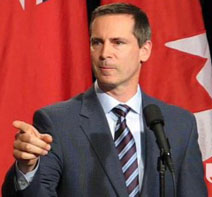
Premier Dalton lowers the boom on expense accounts at arm's-length agencies, boards, and commissions, September 1, 2009.
The taxpaying people of Ontario have not had to wait long to hear Premier McGuinty himself opine on the larger problems to which the latest OLG toil, trouble, and bubble may point.
As reported in the Toronto Star today: “Stung by two devastating spending scandals, Premier Dalton McGuinty has ordered all expenses at provincial agencies, boards and commissions to be reviewed by the Ontario integrity commissioner.
“Under the new rules, employees claiming unacceptable expenses such as alcohol for staff functions and personal items must repay the taxpayers. The move follows explosive details of expenses charged to taxpayers by employees at the Ontario Lottery and Gaming Corp., revealed yesterday. The CEO of OLG, Kelly McDougald, was fired by the government, with cause.
“‘When it comes to our 23 biggest agencies, boards and commissions …Â they (must) follow the same rules we in government follow’Â …Â (the premier)Â said. ‘Their expenses must be approved separately and independently by the integrity commissioner.’
“The message to all is clear, said an angered McGuinty. ‘You have a responsibility to look out for the interest of taxpayers … Just because you operate at arms length from our government, doesn’t give you the right to straight-arm taxpayers. You have a responsibility to be held accountable.’
“If the public doubts the Liberals’ commitment, they should take a look at OLG, McGuinty said.
“‘You must lead by example. If you fail to abide by the rules, there will be consequences,’ McGuinty told reporters … He said the challenge is the boards, commissions and agencies that operate at arms-length. ‘What do we need to do to bring them to heel?” he asked. “That is what this is all about.’ …
“On top of what the premier announced this morning, the government has ordered a review of the 600 agencies, boards and commissions. The relationship between the government of the day and these agencies boards and commissions has been ‘challenging at the best of times,’ McGuinty said … The Liberals have been under intense political fire for what opposition members say is the government’s complete inability to oversee spending in provincial agencies from eHealth Ontario to OLG … The new rules apply to the provinces largest agencies such as OLG, Ontario Power Generation, Hydro One, GO Transit, Metrolinx and the Ontario Clean Water Agency …”

Debi Rosati, CA, ICD.D, who also served on the OLG board of directors that has now resigned, “has over 20 years in financial, operational and strategic management in the technology sector with senior roles in both public and private corporations.”
It is also interesting to look a little deeper into the new interim board of directors at OLG. The previous board had included people like Michael Gough and Beverly Topping – who worked in the private sector (even if, like Mr. Gough, they had earlier public sector experience). Board members were paid modest per diem fees for their time and trouble. (About $200 per day for ordinary members, as I recall from the earlier data on the Public Appointments Secretariat website that has now disappeared [well not entirely], to be replaced by data on the new board, and $350 for the chair: “The full board meets ten to twelve times a year. Members also sit on committees [four in total] that meet from two to eight times a year.”)
The new interim board, which has apparently been appointed for a year, includes five senior employees of the Ontario Public Service. No one will receive any special remuneration, it seems, beyond his or her ordinary salary as an “OPS employee.” The new chair of the OLG board of directors is Peter Wallace – who is also the deputy minister of finance (or, if you like, the civil servant who reports directly to finance minister Dwight Duncan).
It will be interesting as well to see just what this interim board does with OLG over the next several months – and in particular what it does about replacing Kelly McDougald as chief executive officer.
Meanwhile, the key questions remain: has Premier McGuinty over-reacted to a tempest in a teapot at an OLG organization that was already setting its house in good enough order? Or has he deftly bailed his government out from under (yet another?) potentially quite damaging (if still not altogether rationally serious) scandal? Some will say almost certainly – one way or the other. Others will say that at best it is too early to tell. We will have to wait and see what happens in the by-election in St. Paul’s in downtown Toronto, on September 17.
UPDATE SEPTEMBER 4. The Toronto Star has been pursuing the issues here in various directions over the past few days. See: “Casino contracts under fire … OLG stops payment and launches audit of $2 million ‘surcharges’ on construction deals” ; “Casino builder told two different stories … Construction company didn’t inform agency of special surcharges” ; “Integrity could be booming business, thanks to Premier’s crackdown on expenses” ; and “EDITORIAL … Rethink crown agencies.”
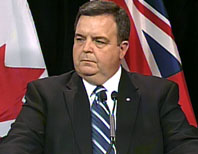
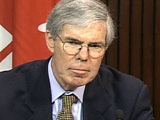



Just wondering if you can figure out how much the OLG is making. The pick3 is simple they payout 50% of what they bring in. The Lottomax and 649 draws seem much more complicated.
The Public Accounts of Ontario 2010-2011 shed some general light on your question Albert. See the table in volume 2b, page 2-84, on the Ontario Lottery and Gaming Corporation.
http://www.fin.gov.on.ca/en/budget/paccts/2011/11vol2bEng.pdf
For the year ended March 31, 2011, “Revenues from Lotteries and bingo” were $3,320,994,000.
“Operating expenses for Lottery and bingo prizes” were $1,835,865,000. Examples of other expenses included “Commissions” $234,527,000, “Gaming and lottery operations” $118,213,000, “Marketing and promotion” $59,446,000 , and “General and administration” $56,885,000.
Total OLG “Net income” for the year ended March 31, 2011 was $907,886,000. So, very quick and dirty, it seems fair enough to say that, during the most recent year for which statistics are now available, the OLG made a little under $100 million less than $1 billion for the people of Ontario.